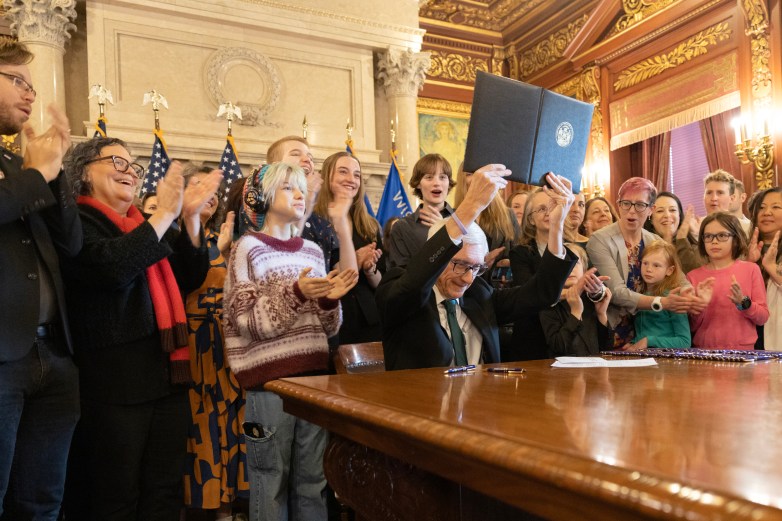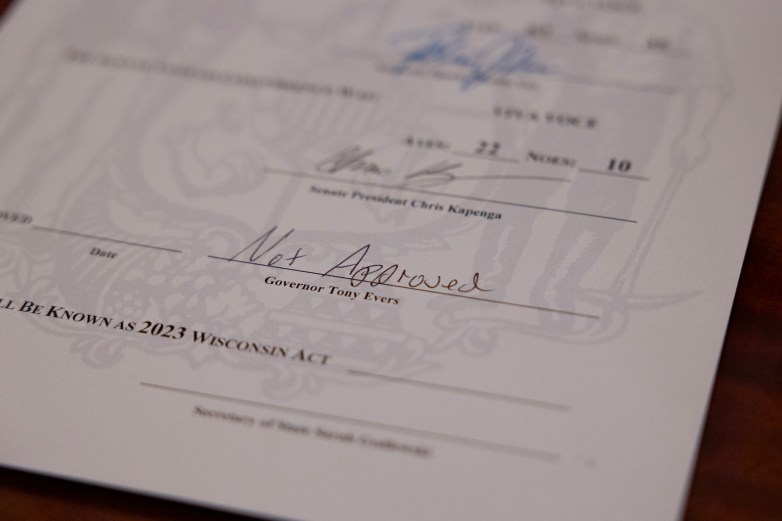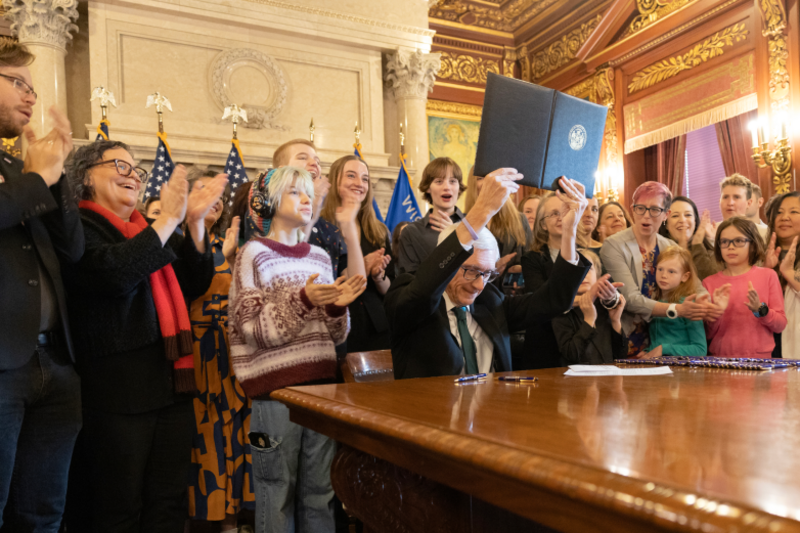- Gov. Tony Evers vetoed a bill that would ban youth transgender care in Wisconsin. He is the sixth governor to do so, though four of the other vetoes were overturned.
- 22 other states have banned surgical or medical transition care for minors, including 19 states this year as religious conservative groups push the issue.
- “I am vetoing this bill in its entirety because I object to the Legislature’s ongoing efforts to manufacture and perpetuate false, hateful and discriminatory anti-LGBTQ policies and rhetoric in our state,” Evers said in a veto message.
- Senate Majority Leader Devin LeMahieu, R-Oostburg, said his caucus, with a two-thirds majority, hasn’t decided whether to override the veto. But he added that he’s not opposed to overriding a veto if the Assembly, which does not have a Republican two-thirds majority, does so while taking advantage of absent Democrats.
Transgender youth will continue to have access to gender-affirming care in Wisconsin after Democratic Gov. Tony Evers, as promised, vetoed a Republican bill that would have banned medical transition for those under 18.
“This was obviously a bill that was begging for a veto … (and) messing with people’s lives,” he said at a closed ceremony on Wednesday morning, surrounded by 80 opponents of the bill including trans youth, health care providers and LGBTQ+ advocates — the “biggest veto” crowd he said he’d ever seen.
Afterward, Evers handed his veto pen to Charlie Werner, a teenager wearing a hat crocheted in the blue, pink and white of the trans flag.
“This type of legislation, and the rhetoric beget by pursuing it, harms LGBTQ people and kids’ mental health, emboldens anti-LGBTQ hate and violence and threatens the safety and dignity of LGBTQ Wisconsinites,” read his veto message.
Evers joins five other governors in the nation who have rejected bills banning gender-affirming care for trans youth. Legislatures overrode those vetoes in all but one, Kansas. Wisconsin Republicans, just two Assembly members short of a supermajority, could override the veto later this session if even three Assembly Democrats are absent.
Senate Majority Leader Devin LeMahieu, R-Oostburg, told Wisconsin Watch in a Wednesday interview that his caucus has not specifically discussed overriding Evers’ veto of the gender-affirming care ban.
Generally speaking, LeMahieu said, Republicans in the state Senate — who hold a two-thirds majority in the chamber — would be open to overriding a veto if Assembly Republicans were able to do so. He said he did not have concerns about enacting rejected legislation into law even if Assembly Republicans were only able to override a veto using procedural maneuvers.
For lawmakers to enact legislation thrown out by the governor, the first override vote has to occur in the chamber where the bill originated. In this instance, it was the Assembly, so the Senate will not be able to act until the Assembly does, despite Republicans having two-thirds control of the chamber.

In an exclusive interview, Evers told Wisconsin Watch while he was confident the veto would survive, “we’re not gonna take anything for granted.” He said the bill shows the “real high” stakes of elections, made more so by gerrymandered political maps that have given Republicans an outsized advantage in the Legislature. The maps are being challenged before a newly liberal-controlled Wisconsin Supreme Court.
“At the end of the day we’ll be in a better position there,” Evers said. “In the meantime, we'll keep fighting.”
Gender-affirming care is best-practice, doctor-prescribed treatment endorsed by every major medical association in the United States. Peer-reviewed research has shown that social transition and medical care, such as puberty blockers and hormones targeted by the bill, improve the lives of those with gender dysphoria.
About 0.5% of adults and 1.4% of youth ages 13 to 17 in the United States are transgender, according to The Williams Institute at UCLA School of Law, a leading researcher for LGBTQ+ people.
In Wisconsin transgender care for children is prescribed with the involvement of medical professionals and parents. It does not involve the use of medication until puberty and does not involve surgery in most cases until adulthood.
Yet 22 states have outlawed medical or surgical transition care for transgender youth, with 19 states passing bills this year alone during a historic and unprecedented period of anti-transgender policymaking. Some take effect next year; others have been temporarily or permanently blocked by courts.
A coordinated conservative and Christian nationalist movement has fueled the deluge. Wisconsin’s ban, introduced by Rep. Scott Allen, R-Waukesha, mirrored model legislation from the right-wing Family Policy Alliance, which strives to conform all levels of government to a “biblical worldview.”
Wisconsin Watch documented the importance of gender-affirming care for transgender youth in October, finding bans loom large for trans youth and their families.
“Rarely an appointment goes by where a family doesn’t ask about this: ‘If we started this care, will we be able to continue it?’ ” Dr. Britt Allen previously told Wisconsin Watch. Allen provides gender-affirming care through UW Health to trans youth and attended the ceremony.. “I have seen firsthand that it has really impacted mental health.”
Evers sided with doctors in his veto message.
“I object to restricting physicians from providing evidence-based and medically appropriate care to their patients, restricting parents from making decisions with physicians to ensure their kids receive the health care they need and preventing patients from receiving that basic, lifesaving care,” Evers said.

A shared disinformation playbook has eased the passage of these bans across the country. In Wisconsin misinformation swirled around the bill, from an hours-long public hearing to debate on the Assembly floor.
For now, transgender youth will be able to access the care they need at the state’s two clinics, where social support is provided in early childhood and puberty blockers and hormones may be prescribed in adolescence.
“Especially important to me personally,” Evers added, “I am vetoing this bill in its entirety because I object to the Legislature’s ongoing efforts to manufacture and perpetuate false, hateful and discriminatory anti-LGBTQ policies and rhetoric in our state.”
Wisconsin Watch reporter Jack Kelly contributed to this report.
The nonprofit Wisconsin Watch (www.WisconsinWatch.org) collaborates with WPR, PBS Wisconsin, other news media and the University of Wisconsin-Madison School of Journalism and Mass Communication. All works created, published, posted or disseminated by Wisconsin Watch do not necessarily reflect the views or opinions of UW-Madison or any of its affiliates.
This article first appeared on Wisconsin Watch and is republished here under a Creative Commons license.![]()



Add new comment